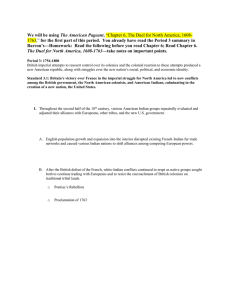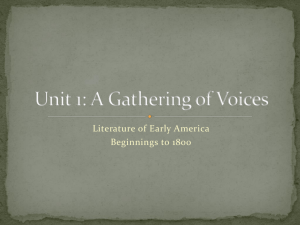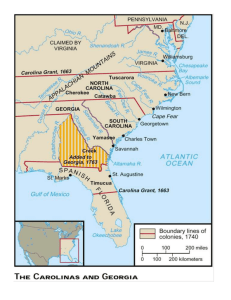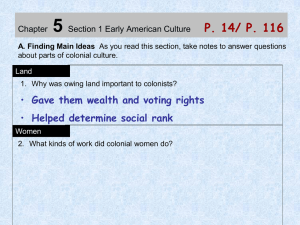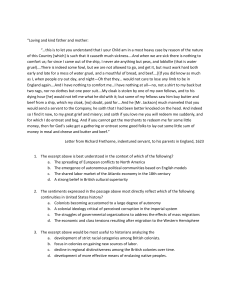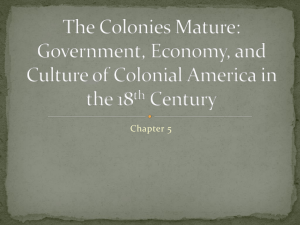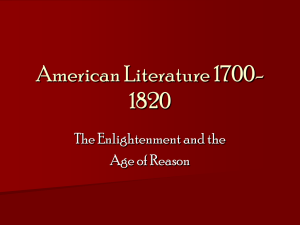A Gathering of Voices: Literature of Early America
advertisement
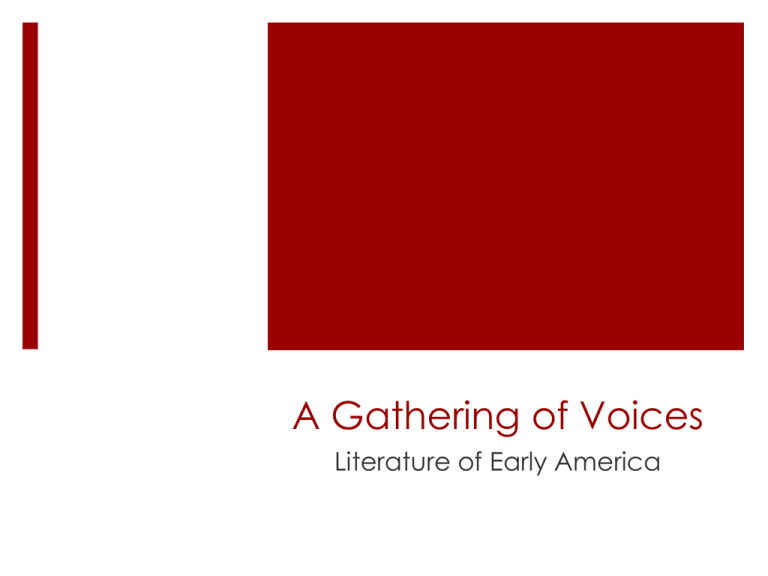
A Gathering of Voices Literature of Early America Snapshot of the Period What is the relationship between literature and place? How does literature shape or reflect society? What makes American literature American? Snapshot of the Period North America was populated by several hundred Native American tribes There were also enslaved Africans who made the journey against their will. They wrote accounts of their experiences. By 1699, European colonies dotted the entire Eastern seaboard. By 1776 13 of these colonies declared their independence from England. This influx of Europeans had a lasting impact on the Native Americans. Historical Background~ Early America (until 1800)~ THE FIRST AMERICANS: The rich cultural presence of Native American tribes spanned the continent, and the Native American oral literature-myths, legends, songs, begins our literary heritage. The first colonists arrived in late 1500s. They learned woodcraft and agriculture from the Native Americans. These men and women were tough and hardy, but without the help of the Natives, they probably would not have survived! Puritans, Pilgrims, and Planters In 1620 the Mayflower sailed into Plymouth. The passengers were religious reformers who tried to purify the Church of England. These Puritans, called Pilgrims, gave all their energy to build communities based upon the Bible. The Southern Colonies differed greatly. They were based upon climate, crops, and social organization. The Age of Reason The Enlightenment shocked the Puritan beliefs. This age was inspired by brilliant scientists and philosophers. These thinkers valued science, logic, and reason over faith. They believed that people are good by nature and capable of building a better society. They spoke of a social contract that forms the basis of government. They laid the groundwork for the American Revolution. The Birth of a Nation Taxes upon taxes imposed by British beat down American Colonists. They met at the First Continental Congress, and in 1775, Minutemen fired “the shot heard around the world.” There was 6 long years of battles and blood shed, and finally the British surrendered. Heroes of the Revolution, Washington, Adams, and Jefferson, helped America to firmly establish its political identity. Key Historical Themes Europeans came to America to create a “city upon a hill,” an ideal community founded on moral and religious values. Colonists, with the help of Native Americans, learned to make the Wilderness productive, on both small farms and large plantations. The United States arose from Enlightenment ideas—that people are basically good and can use reason to create a better society. What is the Relationship Between Literature and Place? Places of Wonder- The colonists discovered long shores and sandy beaches. They found mountains and fertile valleys. Nature in America was immense. It was not Europe! At One with Place- America was a place apart, but not so in the eyes of the Native Americans. In their culture, people belonged to the land. Nature was not to be feared as an enemy or obstacle, but rather honored as a source of life. Nature was celebrated in myths, rituals, and songs. What Were the Colonists’ Attitudes Toward the New World Environment? People did not belong to the land. The land was owned by the people and it was to be claimed, measured, divided, bought, sold and governed by the Europeans. The Colonists’ Attitudes Dream vs. Reality- The American colonists view toward the American environment was a blend of dream and reality. The dream was to create a community governed by religious principles. The reality was to avoid starving to death or falling prey to the cold or animals. They saw beauty but felt the harsh reality of staying alive. Independent Place and People- By the 18th century the Europeans were more secure. Tree by tree, they tamed the wilderness to build towns, roads, schools, and churches. They worried less. They realized that they lived in an independent place, but were not independent people. The effects of the Enlightenment began to settle. They could belong to themselves and not a monarch. The same self reliance they used earlier would be the one they would use to fight kings! How Did These Attitudes Towards Nature Show Up in Literature? The Native Americans and nature showed up in myths and legends. The early explorers wrote journals, reports, and letters. As the colonies developed technology improved and agriculture flourished. Nature became symbolic for writers. What Makes American Literature American? Themes! What were the early American themes? Wilderness- insights into nature and meaning of the wilderness through details used to describe it. Community- public writing such as pamphlets and newspapers, conveyed the message that America was a place of community and independence. Individualism- Writers made clear that self reliance and individualism are fundamental American values, in everything from laws to lyric poems. What Social and Political Forces Affected Early American Literature? Puritanism- In hymns, sermons, and histories, they aimed for self examination and spiritual insight. Enlightenment-By the 18th century the power of reason influenced society. Reasoned documents were a rational argument for independence. Native Americans and African Americans- These individuals left deep marks in American literature. They often provided heartrending stories! What Were the Major Roles of Early American Writers? Writer as a Poet and Historian Writer as Preacher and Lawmaker Writer as Autobiographer
